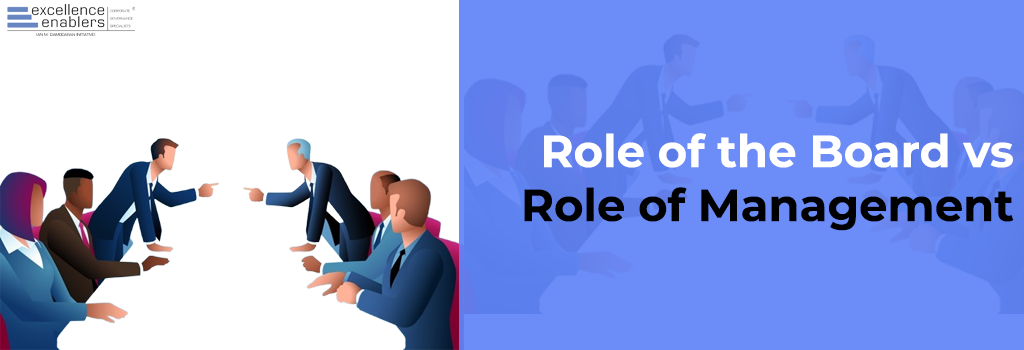In a Governance landscape, it is crucial to understand the fundamental distinction between the roles of two vital pillars of the Company, i.e. the Board and the Management. Given their respective positions, the roles of the two significantly differ in terms of their responsibilities, authorities and focus. What is prevalent in the Indian context is that in Promoter-led Companies, the boundaries between the roles of the Board and the management often blur, leading to potential conflict of interest and governance lapses. This makes critical to ensure that the roles of Board and Management are clearly defined, differentiated and effectively implemented.
Understanding the Board and the Management
The Board is a governing body of a Company, composed of experienced individuals elected by the shareholders. Board’s role is superintendence, direction and control. Its foremost duty is to protect the interests of all stakeholders, including minority shareholders. Board is expected to provide strategic direction, hold the management accountable, and ensure effective governance, and long-term value creation. Board’s primary role is to govern.
The Management refers to the group of full-time employees, led by a designated head, which is responsible for the Company’s day-to-day operations, and ensuring execution of decisions approved by the Board. Management is accountable to the Board and operates under its guidance and delegated authority. Management’s primary role is decision-making and execution.
Are their roles clearly defined in Law?
The role of Board of Directors and Management are distinct yet interdependent, where the Board is responsible for strategic oversight and governance and management is entrusted with execution and operations.
However, these roles are not explicitly codified in a single law. The roles are however given under various sections of the Companies Act, 2013 (the Act) and SEBI’s Listing Obligations and Disclosure Requirements (LODR) Regulations, 2015 (LODR),
However, due to the absence of an established framework, there is often an ambiguity relating to their roles, which causes avoidable overlaps, and blurred accountability. Also, in a situation where there is a promoter or dominant shareholder, it is often seen that the same individual or family often performs the role of Board and management.
What happens when roles overlap?
A lack of role clarity or an overlap in the roles can result in:
- Conflict of interest,
- Hindrance in company’s operations,
- Board getting into management domain, and focusing on execution, rather than focusing on strategy,
- Micromanagement by the Board,
- Deteriorating Board independence,
- Dilution of accountability and transparency,
- Blurred line of control
- Sub-optimal performance of Board level Committees,
How ideal Governance framework should be?
For the Board and management to perform effectively, there should be clarity of their respective roles. Companies should have proper documents, such as Charters for Board and committees, defining their roles, responsibilities and authority. It is also important that this should be communicated to each Director, so that there is no overreach on his/her part.
In an ideal Governance framework, Board and Management should work together without stepping on the shoes of the other.
The following table outlines some of the key roles of the Board and Management.
Role of Board
- Set the vision, mission and strategic direction for the Company and provide a long-term direction.
- Establish objectives and major goals for the Company and stay focused on its direction over time.
- Set the tone at the top and ensure strong governance culture.
- Accountable to all stakeholders, including minority shareholders.
- Ensure compliance with laws and regulations.
- Ensure independence of decision-making.
- Ensure effective functioning of Committees of Board and evaluate the performance of Committees.
- Review, finalise and approve all key corporate policies. Monitor the implementation of such policies and periodically review and update the policies.
- Promote ethical conduct, transparency and accountability throughout the organisation.
- Review risk exposures and mitigation measures across the business.
- Maintain oversight over financial reporting and internal controls.
- Ensure integrity of financials and timely reporting.
- Approve business plans and budget.
- Supervise succession planning for Board and Management.
- Hold management accountable.
- Monitor and evaluate management’s performance and hold them accountable.
- Leading the Company in crisis management and put in required efforts when necessary.
- Periodical engagement with various stakeholders to understand possible changes to be brought in the Company.
- Keep a strong oversight of changing environment and discuss the change in strategies as and when needed.
- Ensure the Company adopts strategies related to changing environment, like environmental, social, and governance (ESG) matters, Cyber Security and Geo-political risks etc.
Role of Management
- Responsible for execution of operations and day to day working of the Company.
- Accountability to the Board. Report performance, systems and compliance to the Board.
- Planning, organising, staffing, directing and controlling.
- Set clear, goals and strategies in alignment with Board’s decisions.
- Achieve business targets, execute plans and implement Board approved strategies and decisions.
- Ensures timely disclosures to the Board and Regulators.
- Draft policies, ensures its implementation and suggest revision based on operational and regulatory changes.
- Ensure operational efficiency, resource utilisation and continuity of business.
- Ensure implementation of compliance process.
- Supervise various departments and functional team of the company.
- Evaluate the team performance and taking corrective steps.
- Prepare and present accurate financial statement and operational reports.
- Ensure organisational alignment and strategic goals.
- Ensure efficient allocation of various resources.
- Responsible to create a risk management framework and ensure the organisation is prepared to potential threats and challenges.
- Maintain confidentiality and data security of critical information.
- Ensure integrity and safety of data and documents, books of accounts, records and statutory register.
- Keep a track of change in the business environment and update the Board timely on the same.
Conclusion
Role clarity is at the base of an effective Board and management interface and working relationship.
Nidhi Kapoor

